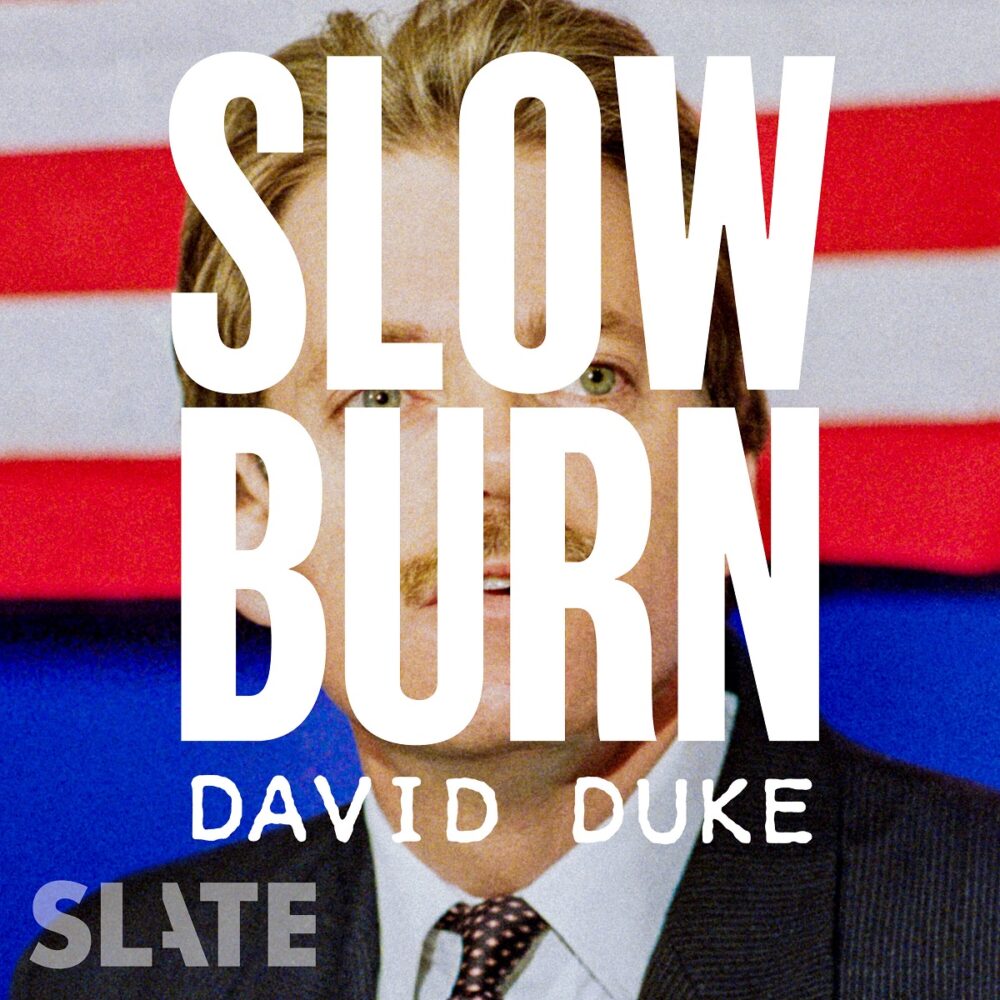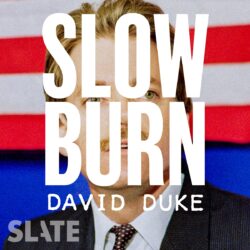Wolf at the Door
Amid a bumper crop of Louisiana-themed podcasts released in 2020, Slow Burn: David Duke stood out for its breadth and humanity
Published: February 28, 2021
Last Updated: June 9, 2023

Slate
Slate’s Slow Burn: David Duke podcast is the inaugural Louisiana Endowment for the Humanities Best in Digital Humanities awardee. Awards in this category recognize publicly accessible digital humanities projects, including websites, podcasts, virtual exhibitions, and other born-digital initiatives that bring new insights to and/or significantly improve the public’s understanding of the state, its history, and/or its culture.
To describe the fourth season of Slate’s Slow Burn as a podcast about David Duke gives the former Klansman and neo-Nazi more credit than he deserves. Josh Levin’s six-part series is as much about the people who fought to prevent Duke from becoming governor of Louisiana in 1991 as it is about Duke himself.
The series debuted on streaming platforms on June 10, 2020, and hour-long episodes premiered weekly until July 22. Previous seasons of Slow Burn featured longform explorations of the Clinton impeachment, the Watergate scandal, and the unsolved murders of rap artists Tupac Shakur and Notorious B.I.G.
Levin, a forty-year-old New Orleans native and national editor at Slate, worked behind the scenes on Slow Burn’s first three seasons. For the fourth, he stepped into the role of host in order to explore a subject that had interested him for decades: the rise of David Duke.
“The Duke story has been in my head for a long time, since I was a kid in New Orleans in the early nineties,” Levin said. “I didn’t want to do it as a one-off article. This was an opportunity to do it in a way that gave the story the amount of space and rigor that was necessary.”
While the series features interviews with numerous politicians and political insiders, some of the most refreshing and compelling moments come courtesy of the ordinary citizens whom Levin has woven into the story. In part six of the series, Levin briefly turns the spotlight on Kirby Newburger, a Republican in Metairie who found the idea of David Duke as governor so unacceptable that he printed one thousand anti-Duke bumper stickers and handed them out in traffic. While a less-skilled storyteller may have dismissed Newburger’s minor act of protest as an inconsequential historical footnote, Levin uses it to illustrate how everyday people found themselves drawn into the culture war ignited by Duke’s gubernatorial campaign.
There are moments that would be comical if the story of David Duke were not so disturbing. In an attempt to improve his image, Duke rebrands cross-burnings as “cross-lightings.” Levin referred to this as “one of the more remarkable examples of euphemism” in a story that has much to say about how extremists use rhetoric to make fringe ideas more palatable to average Americans.
“The whole David Duke story is a branding exercise,” Levin said. “It’s about taking a toxic, racist, white nationalist iconography and transforming that into a more milquetoast image of a guy in a suit.”
The podcast format is an exceptional way to present this story, which is populated by characters from every corner of Louisiana. As Duke and his campaign ping–pong around the state, pursued by supporters, protestors, journalists, and activists, listeners are treated to a variety of Louisiana dialects. There are the identifiable accents of well-heeled socialites in New Orleans, Cajuns in Crowley, country folks in Bossier City, and mish-mashes that illustrate the evolving, living nature of language.
“The whole David Duke story is a branding exercise…. It’s about taking a toxic, racist, white nationalist iconography and transforming that into a more milquetoast image of a guy in a suit.”
One of the most enthralling voices in the series belongs to Anne Levy, a Holocaust survivor who confronted Duke in June 1989 as he toured a traveling Holocaust exhibition at the Louisiana State Capitol. Levy, a fifty-three-year-old antique dealer in New Orleans, saw that the media had gathered for the exhibit’s opening. She summoned the courage that helped her family survive the Warsaw Ghetto and confronted Duke—a vocal Holocaust denier—as the cameras rolled. “I had to speak up,” Levy said. “It took over my body, I just had to do it.”
Like Newburger’s bumper stickers, Levy’s headline-grabbing confrontation with Duke cannot be said to have prevented him from becoming governor. Levy was just one figure among hundreds—Black, white, Jewish, Christian, Republican, Democrat, rich, and poor—who decided that they could not stand by while a white supremacist strolled into the Governor’s Mansion. By zooming in on the people who played small roles in bringing about Duke’s political demise, Levin has created a story about how activism works.
Levin doesn’t see Duke’s loss to Edwards as a clear-cut failure. He is quick to point out that the candidate—who had been photographed in a Nazi uniform, served as Grand Wizard of the Ku Klux Klan, and operated a Nazi bookstore while holding elected office—received more than 671,000 votes, or nearly 39 percent of all votes cast in the gubernatorial runoff. Fifty-five percent of white voters in Louisiana voted for Duke.
“What Duke did was try to win statewide by creating an appeal that was specifically crafted to make white people angry and resentful, and he was largely successful,” Levin said. “Hopefully, it’s useful to show people how this happens, whether it be past, present, or future.”
Slow Burn: David Duke may be streamed for free on Apple Podcasts, Spotify, Google Play, and numerous other podcasting platforms. Listeners can also find podcast episodes, bonus content, and supplemental materials at slate.com.
